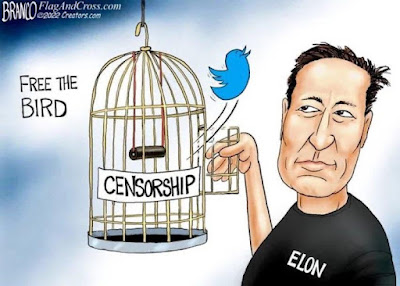Elon Musk, a renowned entrepreneur and technology visionary, has taken a stand against social media censorship by championing the practice of fact-checking.
Through his influential voice and actions, Musk aims to promote transparency and combat the spread of misinformation on various social media platforms.
Musk who now owns Twitter, firmly believes that fact-checking is a vital tool in fostering transparency within the realm of social media. Rather than endorsing censorship, he sees fact-checking as a means to ensure that accurate information prevails, while curbing the dissemination of false or misleading content. By providing users with verified facts and context, Musk believes that social media platforms can empower individuals to make informed decisions.
With the widespread influence of social media, Musk acknowledges its potential to shape public opinion and impact society. He understands that allowing unverified information to proliferate can have far-reaching consequences. By actively supporting fact-checking efforts, Musk aims to mitigate the negative effects of misinformation, which can distort public discourse and hinder rational decision-making.
In a recent development, Elon Musk has expressed his support for Twitter's implementation of fact-checking mechanisms. Contrary to claims suggesting censorship, Musk believes these efforts are aimed at promoting transparency and combating the spread of misinformation.
Musk's endorsement of Twitter's fact-checking measures came in response to a discussion about online censorship and the role of social media platforms in moderating content. While some have accused Twitter of censoring voices under the guise of virtue, Musk sees the implementation of fact-checks as a positive step in ensuring the accuracy and reliability of information circulating on the platform.
By fact-checking certain claims and providing context, Twitter aims to provide users with a more accurate understanding of the information they encounter. Musk, known for his outspoken nature on social media, believes that this approach can help combat the rampant spread of misinformation, which can have significant consequences in shaping public opinion and decision-making.
Fact-checking is not a perfect process, and it can be subject to biases and limitations. However, Musk acknowledges that it is a necessary step toward mitigating the influence of false or misleading information. By fostering an environment where verified facts are given prominence, Twitter strives to promote a more informed and educated discourse among its users.
Musk's support for Twitter's fact-checking mechanisms aligns with his broader stance on the importance of reliable information and the responsible use of social media platforms. He recognizes that while freedom of speech is crucial, it is equally important to address the potential harm caused by the unchecked dissemination of misinformation.
As the influence of social media continues to grow, the role of platforms like Twitter in shaping public discourse becomes increasingly significant. Musk's endorsement of fact-checking serves as a reminder that efforts to combat misinformation are not necessarily rooted in censorship but rather in promoting transparency, accountability, and the overall well-being of online communities.
Elon Musk's recent praise for Twitter's fact-checking measures highlights the importance of ensuring accuracy and reliability in online discussions. Rather than viewing these measures as censorship, Musk believes they contribute to fostering a more informed and responsible use of social media platforms. As the debate around online information intensifies, it is crucial to seek solutions that strike a balance between freedom of expression and the responsible dissemination of verified facts.
The compliance of certain platforms, like Twitter, with the European Union's censorship code. While some interpret this as acquiescence and subjugation to regulations, others argue it is a necessary step towards responsible content moderation.
Twitter's decision to align with the EU's censorship code, which aims to combat the spread of harmful and illegal content online. Critics argue that such compliance stifles free speech and allows external entities to dictate what can be shared on the platform. However, proponents assert that this collaboration is essential for upholding community standards and ensuring the safety of users.
By adhering to the EU's censorship code, Twitter aims to create an environment that minimizes the dissemination of harmful content, including hate speech, terrorist propaganda, and illegal activities. This approach seeks to strike a balance between fostering free expression and protecting individuals from the potential harm caused by unchecked content.
Implementing content moderation policies can be a complex task, as platforms must navigate the fine line between suppressing harmful content and respecting users' freedom of speech. While some argue that compliance with external regulations limits this freedom, others contend that it is necessary to prevent the exploitation of these platforms for nefarious purposes.
Cooperation with regulatory bodies like the EU allows platforms to align their policies with internationally recognized standards, which can enhance transparency and accountability. By adhering to established guidelines, platforms like Twitter can contribute to a safer online environment while also addressing concerns regarding the spread of misinformation and disinformation.
Critics of Twitter's compliance with the EU censorship code argue that it sets a precedent for potential overreach by governmental bodies, leading to excessive control over online speech. However, proponents highlight that these measures are not intended to curtail freedom of expression but rather to protect users from harmful and illegal content, thus promoting responsible digital citizenship.
As technology and online platforms continue to evolve, the debate surrounding content moderation and censorship remains contentious. Striking a balance between safeguarding users and preserving freedom of speech is an ongoing challenge for platforms like Twitter, which must navigate a myriad of perspectives and expectations.
The decision of platforms like Twitter to comply with the EU's censorship code prompts discussions about the delicate balance between upholding free speech and protecting users from harmful content. While critics raise concerns about potential limitations on expression, supporters argue that cooperation with regulatory bodies contributes to a safer and more responsible online environment. As the discourse surrounding content moderation evolves, it is crucial to continue exploring approaches that strike the right balance between freedom of expression and the prevention of harm.

